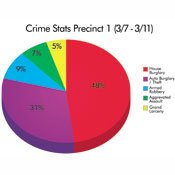Wednesday, March 30, 2011
Dawn Macke has been a Jacksonian for most of her adult life. Eight years ago, the Cleveland, Miss., native bought a house with her then-husband in Belhaven Heights—at a time when she believes crime was more prevalent in the neighborhood than it is today. Then, after a short stint in Las Vegas, she decided to move back to the city and settled in Fondren.
Macke, 42, says she frequently defends her choice of residence from people outside the city limits. "You can't live your life afraid, and if we run from Jackson, then there are no good people left, and all the bad people win," she says. "... To me Fondren just couldn't be any more perfect."
It can be hard to understand why someone would move to Jackson looking only through the window of local media's barrage of crime and blight coverage.
With the release of 2010 U.S. Census numbers, many residents are taking opportunities to proactively address the city's population decline. The data show Jackson's population dropped 5.8 percent in the last decade— from 184,256 to 173,514—a trend that has actually slowed from the previous decade.
Jackson State University professor B. D'Andra Orey, speaking at Koinonia Coffee House's Friday Forum March 25, told the audience that negative perceptions about crime, education and socio-economic problems must change for the city to increase its population.
"You might know (people) who actually moved out of the city, but those are anecdotal cases, and you can't make those inferences based on those few cases that you know," Orey said about conclusions drawn from the 2010 Census. "It's the same with crime."
Various media coverage has focused on the increase of Jackson's black population. Since 2000, Jackson added 7,976 black residents. Orey pointed out that Jackson was not the only city in the metro area to see a trend of increased black populations: From 1990 to 2010, Madison County reported a 53 percent increase in black population, and Rankin County reported an 83 percent increase.
The percentage of blacks living in the South is at its highest point since 1960. Today, 57 percent of American blacks live in the South. Atlanta now has the second highest black population of any metro area, exceeding Chicago. But blacks are also moving to suburbs and smaller towns. The Associated Press reported March 17 that 58 percent of blacks who live in large metropolitan areas in the South live in the suburbs.
Orey also said that while Jackson has more crime than the surrounding suburbs, it has a higher population. The highest incidents of crime in the city are property crimes such as burglaries, not murders or rapes, he said. The Jackson Police Department reports 499 auto burglaries and 720 house burglaries citywide so far this year, compared to 15 rape incidents and six homicides.
Along with JSU visiting professor LeNiece Davis and sociology professor Thomas Kersen, Orey suggested that community members create a coalition made up of city officials, business elite members, social justice advocates, and citizens of various ages and ethnicities to rebrand the city.
Kersen cited the most recent "Cities Ranked and Rated" book from 2007, using data from Sperling's BestPlaces.net, which shows that Jackson's violent crime was below the national average. Jackson scored high for its low cost of living, and its arts, culture and health care. Overall, the city ranked 98 out of 373 cities, based on an composite score in nine categories: arts and culture, leisure, transportation, crime, health and health care, education, climate, cost of living, and economy and jobs.
During the meeting, community members suggested that the city make measurable goals for the next decade, such as increasing Jackson's population to 200,000.
The Hinds County Economic Development Authority is making efforts to rebrand the county by hiring community planning, branding and historic preservation firm Arnett Muldrow and Associates. The Greenville, S.C., firm has conducted rebranding campaigns throughout the country and community planning sessions in Carthage, Holly Springs and Ocean Springs in Mississippi.
The city of Jackson has partnered with the Jackson Chamber of Commerce to produce rebranding materials for the city. While the county's and the city's rebranding may appear to overlap, Hinds County Economic Development Authority Executive Director Blake Wallace said it's important to unite the county and increase collaboration between organizations and municipal governments.
"We are really beginning to link together," Wallace said about Hinds County. "When people put their shoulder to the grindstone and start pushing together—this process that we are going through right now—is just going to make that stronger."

Comments
Use the comment form below to begin a discussion about this content.
Sign in to comment
Or login with:
OpenID